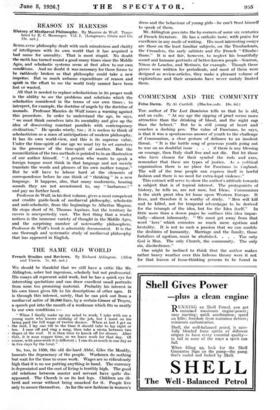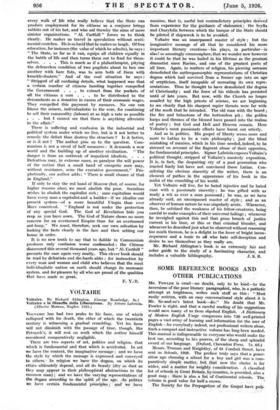COMMUNISM AND • THE COMMUNITY
False Dawn. By Al. Carthill. (Blackwoods. 10s. 6d.) THE author of The Lost Dominion tells us that he is old, and an exile. "'At my age the sipping of gruel seems more attractive than the drinking of blood, and the night cap than the helmet." But he is still young at heart and couches a dashing pen: The value of Faseisano, he saYs, is that it was a spontaneous answer of youth to the challenge of Communism, a clear gesture of defiance to an insolent threat. • " It is the battle song of generous youth going out to war on no doubtful issue . . . if there is any blessing on courage, then Italy shall live and not die. But let those -who have chosen for their symbol the rods and axes, "remember that these are types of justice. As a political organization there is no place for Fascismo in England. The will of the true people can express itself in lawful fashion and there is no need for extra-legal violence."
This extract will serve to show the author's attitude towards a subject that is of topical interest. The protagonists of history, he tells us, are not men, but Ideas. Communism is the sixth great idea let loose upon Western Europe. It lives, and therefore it is worthy of study. " Men will kill and be killed, not for temporal advantages to be derived for the triumph of the idea, but for the Idea itself." In little more than a dozen pages he outlines this idea impar- tially—almost inhumanly. " We must get away from that word ' love ' which connotes so much mere egotism and brutality. It is not to such a passion that we can confide the destinies of humanity. Marriage and the family, those fortalices of egotism, must be abolished. . . . The only God is Man. The only Church, the community. The only sin, disobedience."
One might be inclined to think that the author makes rather heavy weather over this hideous theory were it not for that leaven of loose-thinking persons to be found in
every . walk of life who really believe that the State can produce employment for its citizens as a conjurer brings rabbits out of his hat, and who aid thereby the aims of more sinister organizations. " Al. Carthill " forces us to think clearly. He makes us travel in speculation without senti7 mental crutches. He is so lucid that he makes us laugh. Of free education, for instance (the value of which he admits), he says ; " The State, as far as it can, equips all children equally in the battle of life and then turns them out to fend for them. selves. . . . This is much as if a philanthropist, pitying the, defenceless condition of two pugilists about to box one another with bare fists, was to arm both of them with knuckle-dusters." And of the coal situation he says ; " Stripped of all confusing details, what happened was that a certain number of citizens banding together compelled the Government . . . to extract from the pockets of all the citizens a sum.. . . to be distributed to the demandants as a donative in excess of their economic wages. They compelled this payment by menaces. No one can blame the miners, individualistic to the core, for combining to sell their commodity (labour) at as high a. rate as possible . . . but I cannot see that there is anything altruistic in the affair."
There is suffering and confusion in the industrial and political system under which we live, but is it not better to remedy the defect than destroy the structure ? Is it better, or is it not ? The author pins us to _ the question. Com- munism is not a creed of half measures : it demands a nesy world and the building up of another civilization. " The danger is from an outbreak of impatient idealists. . . Defeatism may, in extreme cases, so- paralyse the will power of the nation that a small band of energetic men may, without resistance, seize the executive government." Pro- phetically, our author adds : " There is small chance of that in England." If only to stay the red hand of Moscow (but, of course, for higher reasons also), we must abolish the poor. Socialism wishes to abolish the capitalist rich; sane capitalism would have every man a capitalist and a builder—if we idealize our present system—of a more beautiful Utopia than ever Marx conceived. " England is not under the protection of any special God. The God of Revelation bids you reap as you have sown. The God of Nature shows no more concern for an overturned Empire than for an overturned ant-heap." We must, therefore, seek our own salyation by looking the facts clearly in the face and then setting our house in order.
It is no new truth to say that to dabble in Communism produces only confusion worse confounded : the Chinese discovered this several thousand years ago, but " Al. Carthill " presents the ease again very neatly. This clever book should be read by defeatists and die-hards alike ; for instruction by every man and woman and child who believes that the most individualistic nation on earth should change its economic system, and for pleasure by all who are proud of the qualities that have made us great. F. Y.-B.











































 Previous page
Previous page